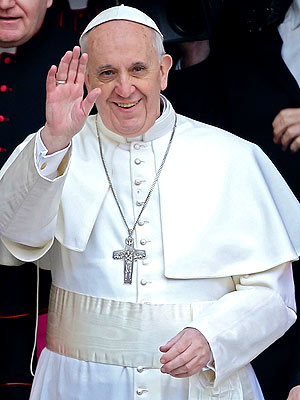Indeed, much has been made of how simple he is ever since he was named as Pope. The media has been beside itself to describe just how simple a man he is - he takes the bus, he doesn't wear the kind of bling jewellery other prelates wear, he washes people's feet. But, in breaking news, I can report a little more on just how simple a man he is. Curious to know more about this new papal father, I called up an old friend, Cardinal G. and he kindly offered to give me the inside word on this simple new Pope.
'Well, yes, it's true, he is simple,' began G., 'but if we're to be a bit more precise about things, we really ought to say that he's not just simple, but a simpleton.'
'What's that!' I cried. 'The Pope, a simpleton?'
'Yes, I mean, it's really quite simple, actually, much like the Pope. We were sitting around the big table in the Sistine Chapel, people were getting a bit scratchy because it had been over an hour since we'd last gorged oursel...I mean, had last had some bread and water, and someone, Cardinal L., I think, you know, that fool from America, said that we needed someone totally fresh, totally new, someone who could rebuild the Church's reputation which, I grant you, is a bit tatty at the minute.'
'So you went for a simpleton? That's the answer to the Church's problems?'
 |
| Pope Francis - all rather simple. |
'Quite. You see, if you recall from the Book of Matthew, Christ once said, 'Verily I say unto you, Except ye be converted, and become as little children, ye shall not enter into the kingdom of heaven.' And so it seemed obvious, really - what we needed was a Pontiff as simple as a child. And Bergoglio was just the man, er, boy, for the job. You see, he may be 76, but he's actually got the mental ability of a four year old. Amazing, isn't it!'
'Quite,' I said, rather nonplussed by the news.
'For a while we considered getting an actual four year old, but then someone pointed out that the Tibetans had already done it with the Dalai Lama.'
'So what can we expect from this simple pope?' I enquired.
'Well, his routine will have to be a bit different - for instance, mornings will include playtime and a nap, so there won't be much papal business done then, but we think he might be able to concentrate for a half hour or so after lunch, sign a few papal bulls, that sort of thing. What's important is that people will see that the Church is good and pure and simple - I mean, obviously, the Church isn't any of those things - it's a festering sore of corruption and debauchery, thank goodness - but it will at least look like it is. We're all really thrilled.'
And there you have it, all rather simple, really.
